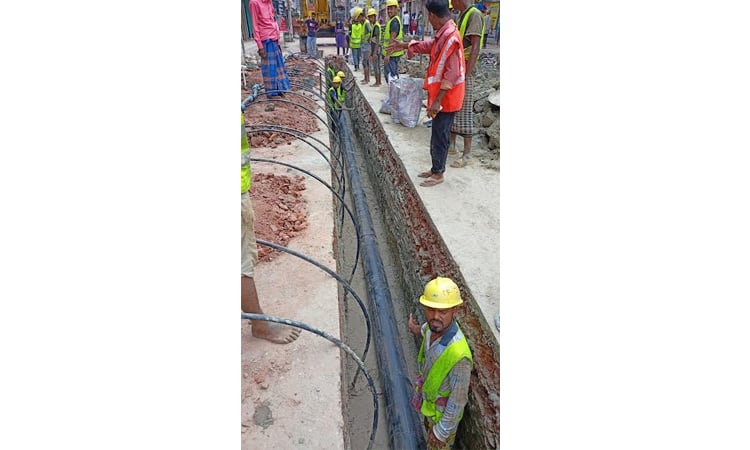
KHULNA, May 27, 2025 (BSS) - The construction of two major sewage
treatment plants, considered the second largest in the country under construction at Mathabhanga and Thikrabadh in Khulna under the Khulna Sewerage System Development Project (KSSDP) is progressing fast.
The treatment plants are being implemented by Khulna Water Supply and
Sewerage Authority (KWASA) and will jointly treat up to 8 crore litres of
household wastewater per day. The construction of the two plants is
estimated to cost Tk 459 crore.
According to KWASA officials, sewage will be collected from homes in Khulna City Corporation (KCC) wards no-16 to 31 through underground pipelines and carried directly to these plants.
After treatment, part of the waste will be converted into organic fertilizer. Work is currently underway across the city to install the necessary pipeline networks and manholes.
At present, household sewage in Khulna is stored in individual septic tanks.
Once filled, the waste is removed by vehicles of the KCC and transported to disposal sites.
However, a significant portion of sewage is still discharged directly into open drains, eventually contaminating local rivers and water bodies, causing both environmental pollution and health hazards.
Considering these challenges, the "Khulna Sewerage System Development
Project" was approved by the Executive Committee of the National Economic
Council (ECNEC).
The total budget for the project is Tk 2,334 crore, of which the Asian
Development Bank (ADB) is providing Tk 1,404 crore in loans, while the
remaining Tk 929 crore is being sourced from the government's own fund. The project is targeted for completion by December 2025.
According to project engineers, the construction of the two sewage treatment plants. One plant is being developed at Mathabhanga, located near the Khulna Riverview Park along the Rupsha River, on 12 acres of land. The other is under construction on 22 acres at Thikrabadh.
Currently, at least 65 percent of the construction work at Mathabhanga and 60 percent at Thikrabadh have been completed.
The Mathabhanga plant will treat approximately 2.80 crore litres of wastewater daily. A portion of the treated waste will be processed into fertilizer, while the remaining treated water will undergo secondary treatment before being discharged into the Rupsha River.
Project officials said that at present, waste from homes is disposed of through two separate pipelines, one carrying human waste from toilets to septic tanks, and another from kitchens and bathrooms to open drains.
Upon full implementation of the project, all types of wastewater from
households and buildings will be directed to the sewage network via a single pipeline system.
These pipelines will be connected to pump stations set up at various locations across the city. Through pressure pumping, the wastewater will be sent to the treatment plants.
Once the project is complete, open roadside drains will carry only rainwater. This is expected to significantly alleviate waterlogging during the monsoon season.
Khan Selim Ahmed, Superintending Engineer of KWASA and Project Director
told BSS, "The installation of underground sewer pipelines and construction of sewage treatment plants is a highly complex task. We are using the latest global technologies to build these facilities."
"We are hopeful that the construction of the treatment plants will be completed within the stipulated timeframe," he added.
In addition, both treatment plants are being built with integrated solar power systems.
The two facilities are expected to generate 1.65 megawatts of electricity per day from solar energy, which will be used to partially power their operations.
Talking to BSS, Sheikh Ashrafuzzaman, president of the Greater Khulna
Development Action Coordination Committee (GKDACC) said that the project
was the long-awaited demand of Khulna people.
Although the project was stopped in an unknown cause, the
KWASA recently started the project in full swing, he said, adding that after completion of the project, a modern sewerage system will be developed and Khulna will be a healthy city.